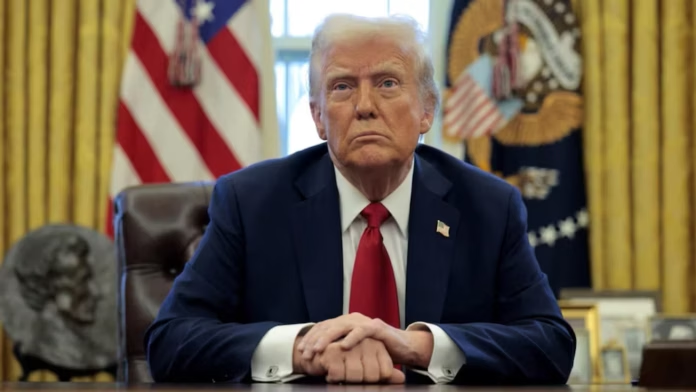Trumps 2-Week Decision on Iran: With tensions mounting between Israel and Iran, former President Donald Trump has also declared a vital two-week deadline to make a decision on possible American military engagement. As diplomacy around the world is ongoing and casualties rise, such a decision would redefine world geopolitics and make an already explosive conflict even more acute.
Escalation on the Ground
The battle, which is seven days old, doesn’t appear to be letting up. At least 639 Iranians have been killed and more than 2,500 wounded in Israeli airstrikes, says a U.S.-based human rights group. Iranian retaliations have resulted in 24 Israelis killed. As the violence escalates, Israel has authorized the building of 1,000 new bomb shelters and is also restoring 500 others as part of efforts to safeguard its people.
Also read: Trump Blames G8 Exit for Russia-Ukraine War
Trump’s Critical Decision
Speaking on June 19, Trump indicated he would make a decision in two weeks on whether to approve a U.S. military attack on Iran’s nuclear facilities. “I will make my decision whether or not to go within the next two weeks,” he told journalists.
This revelation comes in the midst of intense debate among U.S. intelligence communities. Trump’s comment came at direct odds with National Intelligence Director Tulsi Gabbard’s evaluation that Iran is not actively seeking nuclear weapons. “She’s wrong,” Trump declared, indicating a very personal conviction that Iran constitutes an imminently dangerous threat.
Trump’s ultimatum of two weeks places huge pressure on global players and his domestic constituency. A military strike would potentially escalate the war significantly, pulling the U.S. into a regional war of unpredictable consequences.
Diplomatic Hopes and Uncertainty
As Trump considers military action, diplomats are negotiating in Geneva. Iranian Foreign Minister Abbas Araghchi has met with counterparts from Britain, France, Germany, and the EU. Diplomats are discussing a resolution to hostilities and the return to a diplomatic path. Significantly, U.S. envoy to the Middle East Steve Witkoff was absent.
France is advocating a hard line, President Emmanuel Macron demanded Iran not enrich nuclear material. He also asked for IAEA inspections of all nuclear facilities, restrictions on Iran’s missile program, and the release of hostages. France has put forward a ceasefire and de-escalation framework, but no firm results have been seen.
Switzerland, the primary go-between for the U.S. and Iran, has shut down temporarily its embassy in Tehran amid security concerns. Expatriate workers have been evacuated and will be back when conditions stabilize.
Social Response and Civilian Toll
As the fighting intensifies, ordinary civilians are paying the price. Contact between families in Iran and outside Iran has become strained. American Iranians are afraid for their loved ones as the violence escalates.
Evacuations for American citizens in Israel have started. A Florida-based mission collaborated with a nonprofit to fly some of them out after Israeli airspace closed to civilian planes.
Within Iran, youth are using social media to convey their anguish. One viral TikTok is of a young woman escaping Tehran with her family, captioned: “It’s war in Iran but you’re eating chips… Leaving Tehran I can’t stand this anymore…”
Global Stakes
The stakes of Trump’s two-week gamble are huge. An attack on Iran may unleash wider war in the Middle East, upset global oil markets, and test U.S. alliances in Europe and the region.
Conversely, doing nothing might be taken for weakness by some, particularly in Israel. Trump’s position also has implications for U.S. electoral politics, making him a strongman at a time of global crisis.
Also read: Ronald Bland Granted Bond in Decatur Murder Case
Conclusion
In the coming days, all eyes will be on Geneva, Tehran, and Washington. Whether diplomacy prevails or the world moves closer to another U.S.-led military intervention remains uncertain. What is clear: the next two weeks will be pivotal for global peace and security.








